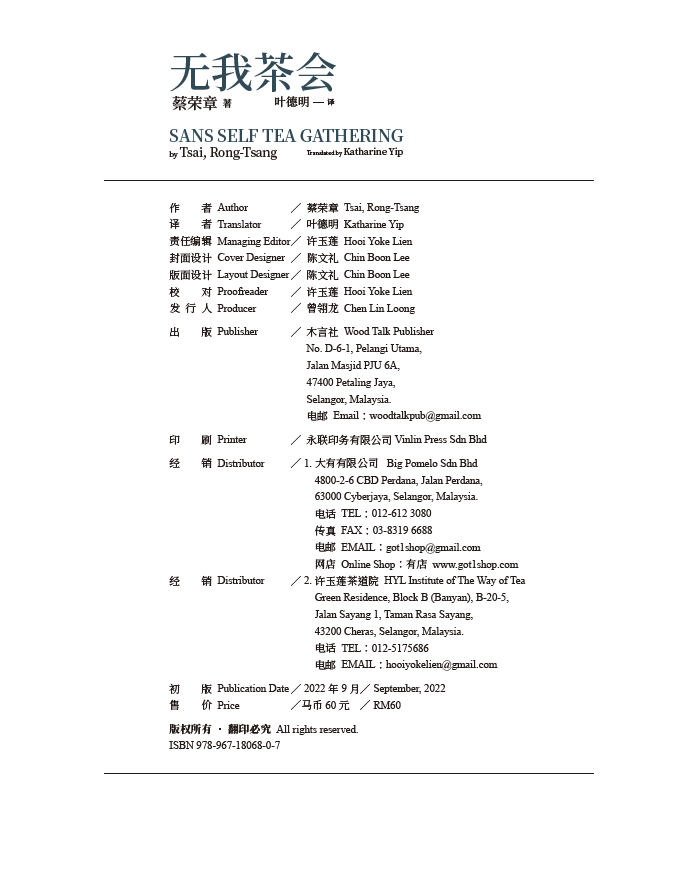
《无我茶会》中英文版译者感言
文:叶德明(英文翻译者)
随蔡荣章老师学茶少说也十年了。
虽然还没有机会跟老师一起泡茶、奉茶和品茶或听他现场授课,但老师的文字就如一道道精心冲泡的好茶,让我不只啖出了茶的滋滋味味,也一点一滴地领悟茶道的内涵和茶人的期许。
从生涩、迟疑、领会到怡然,这也许是十年来翻译蔡老师茶道文章的心路历程。
译者不一定有机会了解原作背后的理念和思维。能循文字在逾十年间追随蔡老师的茶道足印,接触不同的茶文章并思考字里行间的含义,此经验也只能说是可遇而不可求。
为老师翻译的文字作品涵盖知识技法、观点感想,茶人茶事等;再来,就是无我茶会这个‘无中生有’的完整茶道概念。
从无到有,不只是无我茶会的特色,也是蔡荣章老师从构思到推动无我茶会的写照,通过文字在《无我茶会》一书内有详尽记录。有了文字,还得跨越语言的藩篱才能让它传得更广更远,这促成了此书多个译本,英译版本为其一。
虽说茶是普世同享的饮料,但在不同文化的投射下有着不同的象征意义。茶道天地宽广,要在两种语言里找到完全对等的词汇来表达茶道精神是不太可能的。 作为本书的英译者,除了字义层面外,我也探究作者的寄意,以便更精准地呈现无我茶会的里里外外,好让读者感受它的独特之处。
‘从无到有,有无互替’的核心观念,单向奉茶的 ‘无所为而为’’,将茶安放在‘无何有之乡’的独特视角,凡此种种,都渗透着儒道禅等东方哲思。对我来说,让这些观念、做法和视角通过另一种语言如实重现是个重要任务。因此,《无我茶会》翻译过程中的每个考量和决定都循着这个方向走。
让我以本书第173条 ‘制茶泡茶喝茶都在无何有之乡’ 的开端句为例,加以说明。
原文是“无何有之乡是说这世间本无可以阻挠你的事务,是可以自由发展的。”
译文是“Negative as its connotation may seem, the term Land of Nothingness could be understood differently. It may refer, figuratively, to a place devoid of any interference — a condition that renders it conducive to unadulterated development and the realisation of growth to come.”
‘无何有之乡’一词出自庄周《庄子·逍遥游》,蔡老师引此描绘一个可以在无干扰的情况下自由发展的境界,并以此导入茶的整个生命周期。
将无何有之乡译为 ‘Land of Nothingness’ 是要点出‘无’的境界, 并呼应无我茶会 ‘有’(being) 与‘无’(nothing) 循环不息的特质。
‘Nothingness’ 一字在英语中带有负面含义。例如,剑桥词典将之解释为 “a state where nothing is present, or where nothing exists that is important or gives meaning to life” (意即一切都不存在的状态,或没有任何重要或赋予生命意义的事物)。
要让英文版读者走进《庄子・逍遥游》的语境,我决定以 “Negative as its connotation may seem, the term Land of Nothingness could be understood differently” 作为本条开端。这有别于原文的安排,用意在于提醒英译本读者即使The Land of Nothingness 有其负面含义, 此词在《无我茶会》内的解读和他们所认知的或熟悉的有明显差别。
下接 “It may refer, figuratively, to a place devoid of any interference” ,借此解释The Land of Nothingness在这语境中是指一个没有任何干扰的地方,再来就是按原文翻译成 “– a condition that renders it conducive to unadulterated development and the realisation of growth to come” 以带出“这世间本无可以阻挠你的事务,是可以自由发展的”的意思。
翻译《无我茶会》是一次难得的经验。我期望过程中的每个考量和决定都有助《无我茶会》跨越文化界限,让英译本读者获得与原中文版读者相似的体悟。
文字让我与茶结缘,而茶意也在反复推敲中渗进文字里去。
译者于2022年07月23日
The Translator’s Message
Katharine Yip
It has been more than ten years since I began learning about tea from Master Tsai. Although I have never attended his classes, I have gained an understanding of the Way of Tea and an insight into the aspiration of a genuine tea master through his writings.
Translating Master Tsai’s tea articles is a decade-long journey of discovery. Feeling inadequate at the start, I have become more confident about the subject matter as time passes.
Translators don’t always get to explore the thinking behind the source text. Following the author’s writing footprints over time is one of my most cherished experiences. I was engaged to translate a book on Sans Self Tea Gathering after completing some translation assignments on Master Tsai’s thoughts and opinions.
Master Tsai is committed to nurturing and promoting Sans Self Tea Gathering, a unique manifestation of the Way of Tea he has created. There is a detailed account of this in the book, which has been translated into several languages to help spread the concept and format internationally.
A favourite beverage enjoyed the world over, tea is infused with symbolism. It may mean different things to people from different cultural backgrounds. Conveying the author’s intended meaning in another language is a challenge; when done correctly, it will communicate the same message and deliver the same reading experience to non-Chinese speakers.
Having said that, concepts such as “an unending cycle of being and nothing”, practices such as offering tea in one direction “to eliminate the expectation of reciprocity” and the unique perspective of tea being in the “Land of Nothingness” are rooted in Eastern philosophies; they may not readily resonate with English-speaking readers. My priority was to carry these concepts, practices and perspectives across linguistic and cultural divides.
Take the opening sentence of Segment 173 “The Land of Nothingness: where tea is produced, brewed and taken” as an example.
“无何有之乡是说这世间本无可以阻挠你的事务,是可以自由发展的。” was translated as “Negative as its connotation may seem, the term Land of Nothingness could be understood differently. It may refer, figuratively, to a place devoid of any interference — a condition that renders it conducive to unadulterated development and the realisation of growth to come.”
The phrase “无何有之乡” (literally “The Land with Complete Absence of Everything”) traces its origin to “Zhuangzi·Free and Easy Wandering” by Chinese philosopher Zhuang Zhou. Master Tsai has used it to describe an environment in which unhindered development is possible with the absence of intervention. More specifically, this condition benefits tea throughout its life cycle.
“无何有之乡” was translated as “Land of Nothingness” to create a link to the concept of “an unending cycle of being and nothing” inherent in Sans Self Tea Gathering. However, the word “nothingness” may have a negative connotation. For example, the Cambridge Dictionary defines it as “a state where nothing is present, or where nothing exists that is important or gives meaning to life”.
To put the author’s intended meaning into perspective, the segment begins with “Negative as its connotation may seem, the term Land of Nothingness could be understood differently. It may refer, figuratively, to a place devoid of any interference – ” . The use of explicitation is a means to address possible differences in understanding and underline the context that will connect the readers with the author.
Translating “Sans Self Tea Gathering” is an opportunity hard to come by. I sincerely hope that the English translation will help Sans Self Tea Gathering transcend borders, cultures and languages.
2022-07-23

【新书出版】
书名:《 无我茶会 》中英版
■作者:蔡荣章
■出版社:木言社
■出版日期:2022/9
■ISBN: ISBN 978-967-18068-0-7
■语文:中英
新书上市/《无我茶会》2022年中英版/作者蔡荣章
▄无我茶会创人蔡荣章自1977年开始做茶文化工作至今45年
▄无我茶会自1990年创立至今32年
▄共出版过4种语文(中、日、韩、英)的7个版本
▄操作细节共199条,提出7大精神
▄10多个国家地区举行过,包括台湾、韩国、日本、星加坡、马来西亚、汶莱、英国、意大利、法国、美国、中国等
▄举办超过
10000多场次
▄曾参与人次达500000多
无我茶会,是一种茶会形式的名称,蔡荣章先生将其思维与行动的款式写成《无我茶会》这本书,是当代深具影响力的茶道思想。
马上链接网购:
1/有店网路书店:https://www.got1shop.com/goods.php?id=2715908
2/紫藤:https://www.purplecane.my/SalePage/Index/258855
3/大将:https://bookstore.mentor.com.my/product/wuwochahui/
4/台湾经销处:陆羽茶艺中心,台北市衡阳路64号3楼
联络电话:(02)2331 6636
5/台湾经销处:出色出版社,新北市新店区宝兴路45巷6弄5号6楼
联络电话:(02)8914 6405
6/马来西亚联络处:许玉莲茶道院 hooiyokelien@gmail.com
7/ 台湾联络处:现代茶道思想研究所 rongtsang@hotmail.com
(173)